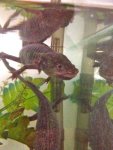Laurab
New member
I have 4 mature axolotls in a 50 gallon tank. They all seemed fine until one day I noticed one axolotl's mouth had turned kind of white and looked puffy. After a few more days his mouth had started to recede and he couldn't close his mouth all the way and when he went up for air it would make this sucking noise. The mouth continued to get worse and then all of the frills on his gills disappeared and it looked like his gills on one side were shrinking. I started changing the water often, cleaning the tank every couple of days and making sure the temp was on the cooler side bc I realized it had been getting kind of warm when the heat was on (towards 70 degrees). That axolotl seemed to get a little better but his lips are still puffy and he stills makes a weird noise when he goes up for air. Now another axolotl's mouth has turned white with a big blood red spot and seems to be doing poorly. This particular one has always been half the size of the others and doesn't seem like the best swimmer, I don't think it can afford any other issues. I have attached photos of both axolotls, the one with the red mark and new problem around its mouth and the one that seems to be recovering but not fully. No one at the pet store seems to have any real knowledge about what it is or how to treat it and I don't want to do a salt bath if they don't need it. Any thoughts?


